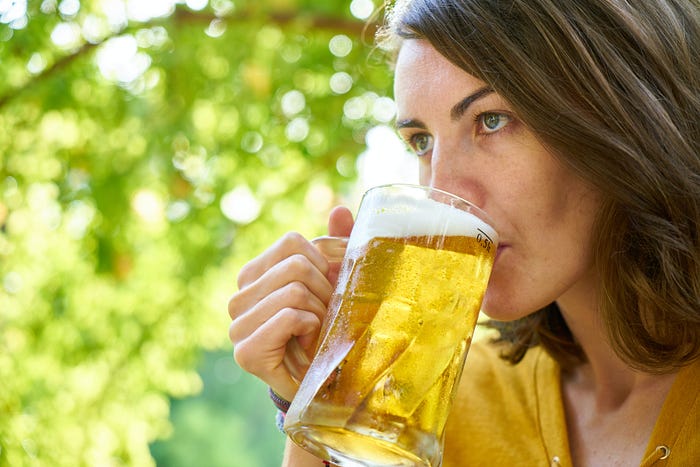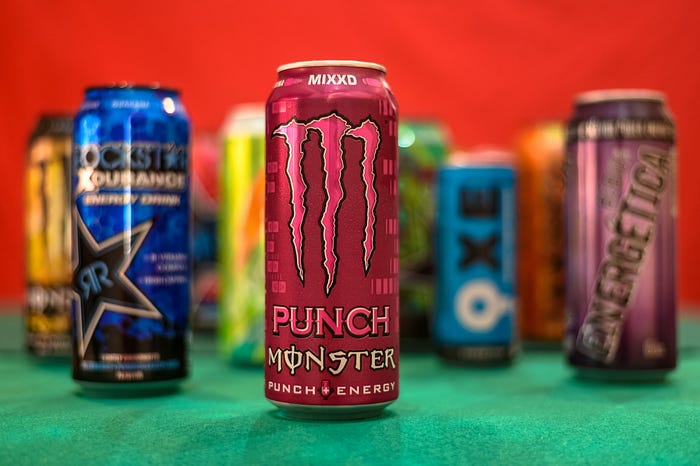4 Drinking Habits To Avoid As You Get Older
The way your body processes what you drink changes as you get older

You pay a heavy price for the wrong habits. It’s even more so if such habits impact your health adversely.
Most of us engage in bad drinking habits that cost us so much in terms of their effect on our lives, from obesity to diabetes, heart disease, and even death.
If you want to live a bit longer, you have to avoid some of these drinking habits.
Regular Intake of Energy Drinks
Energy drink consumption has risen significantly, especially among younger adults. As research shows, two-thirds of those who take energy drinks are between 13–35 years.
People take energy drinks to get an “energy boost” when they feel tired. It can also improve their physical and cognitive strengths.
But energy drinks usually contain a large amount of caffeine. And as you age, regular intakes can severely impact your health.
Studies have linked energy drinks to heart problems, and liver issues.
In one experiment, researchers examined the effects of long-term Red Bull consumption on the heart.
The study used rats which were divided into four groups and given different oral treatments for 30 days.
The RB group received a 1.5 ml/100g body weight of Red Bull. The AL group was given 0.486 mg/100g body weight of alcohol. The ARB group received a combination of the two beverages. The control group was given only tap water.
In the last 6 days of the experiment, the rats were tested for their physical agility by forcing them to swim to exhaustion with a load of 10% of their body weight attached to their tails.
Immediately after swimming exhaustion, they were anesthetized and samples of the heart muscles were harvested for ultrastructural and biochemical analyses.
The result showed a large increase in the heart glucose and glycogen concentrations in the rats that received both RB and ARB.
Total cholesterol concentration significantly decreased in the RB and ARB groups. Total protein concentration and heart muscle activities increased in all groups.
Because rats and humans have similar characteristics, the researchers concluded that people should avoid long-term intake of energy drinks, especially when combined with alcohol.
Here’s what you should do
If you want to take energy beverages, make sure you don’t go above 16 ounces (473 ml) per day and try to limit all other caffeinated beverages to avoid excessive intake of caffeine.
Use more natural energy drinks

Drinking Too Much Coffee
Taking a cup of coffee to start the day is a common ritual of most people.
The National Coffee Association estimates that 7 in 10 Americans drink coffee every week and the average American drinks over 3.1 cups of coffee per day.
Coffee isn’t just an American obsession. It’s also global.
A major reason people drink coffee is the jolt of caffeine it provides.
Caffeine act as a stimulant in the nervous system. When it gets to your brain, it makes you alert, you feel awake and less tired.
But over time, it can make aging worse.
One study evaluated over 40,000 adults and found that drinking more than four cups of coffee a day hurt the body.
It is not entirely clear why this happens, but studies show that caffeine intake causes a measurable increase in blood pressure.
Coffee also worsens dehydration in older people because of its diuretic effect. It also decreases the amount of newly formed collagen in the skin cells and impacts your sleep.
Here’s what you should do
It’s recommended that people stick to no more than 28 cups of coffee a week, which is about four cups of coffee a day.

Drinking sugary drinks
Sugary drinks, such as soda, sports drinks, fruits, and energy drinks are the leading sources of calories and added sugar in diets.
Even though they provide little or no real nutritional value, millions of people around the world take them daily. For instance, 1 in 4 people get at least 200 calories from sugary drinks; and 5% get at least 567 calories—equivalent to four cans of soda — per day.
This is way above the recommended amount of not more than 10% of total daily calories from added sugar.
Sugary drinks are unhealthy for anyone, but they become even more harmful as you age.
Researchers have linked sugary drink intake with a higher risk of frailty in women above 60 years old.
Frailty here is defined based on at least three of five criteria: fatigue, reduced strength, low aerobic capacity, having five or more chronic illnesses, and having at least a 5 percent weight loss during the last two years.
The study had over 70,000 women who filled out food-frequency and health questionnaires.
Researchers then assessed the occurrence of frailty every 4 years throughout the study from 1992 to 2014. Over the 22 years of the follow-up study, 11,559 of the women met the criteria for frailty.
After controlling behavioral parameters like smoking and alcohol intake, women who took more than one serving of sugary beverages a day were 32 percent more likely to become frail than those who drank none.
For artificially sweetened drinks, the results were similar — a 28 percent increased risk for women who had two or more servings a day.
In another study, researchers also looked at the relationship between the intake of sugary drinks and the risk of early death in older people.
The study included 17,930 people with no history of heart disease who were at least 45 years old.
The researchers then followed the participants for six years, using death records to examine the cause of death, focusing on deaths from heart diseases.
Participants who drank at least 24 ounces of a sugary beverage per day were twice as likely to die from heart disease as those who drank less than one ounce.
Several other studies indicate that sugary drinks in older people can worsen blood sugar levels and a greater risk of type 2 diabetes.
Here’s what you should do
You should drink sugar-sweetened beverages in moderation.
The American Heart Association recommends that adult men should limit their daily sugar consumption to no more than 9 teaspoons per day, and women to just 6. Anything above this level is a major risk
Everyday Drinking of Alcohol
Alcohol is among the most toxic beverages that impact major organs of your body, including your digestive and cardiovascular systems.
It affects your body, whether you are 20 or 60 years old. However, the effects of alcohol become weigh more heavily the older you get.
The reason is that the way your body processes alcohol changes with age.
As you get older, the organs that metabolize alcohol, such as the liver and the stomach shrink. As a result, alcohol stays longer in your system.
When you drink alcohol, it enters your small intestine without being digested and is absorbed through your small intestinal walls. It then travels to your liver, where it is processed by a series of enzymes that break it down into chemicals.
These chemicals move through your blood into your heart, lungs, brain, and other organs.
Your muscle mass decreases by 3–8% every ten years after the age of 30 and this rate of decline is even higher after you hit 60. This, a high concentration of alcohol remains in the bloodstream every time you drink.
Alcohol in your bloodstream allows a toxic chemical, called acetate, to build up in your liver. Over time, acetate damages your liver tissues, causing cirrhosis.
Cirrhosis is a late-stage liver disease in which healthy liver tissue is replaced with scar tissue and the liver is permanently damaged.
In addition, drinking too much as you age increases your risks of accidents, diabetes, high blood pressure, heart failure, memory failure, etc.
Here’s what you should do
The National Institute on Aging recommends that people who are 65 years or older should drink no more than seven alcoholic drinks in a week, with at most one drink for women and two for men on any given day.

Recap: 4 harmful drinking habits
Aging is an inescapable human phenomenon that comes with declining health. Some drinking habits can make the effect of aging more severe. As a result, it’s best to avoid the following drinking habits:
- Regular intake of energy drinks
- Excessive drinking of sugary beverages
- Drinking too much coffee
- excessive consumption of alcohol
